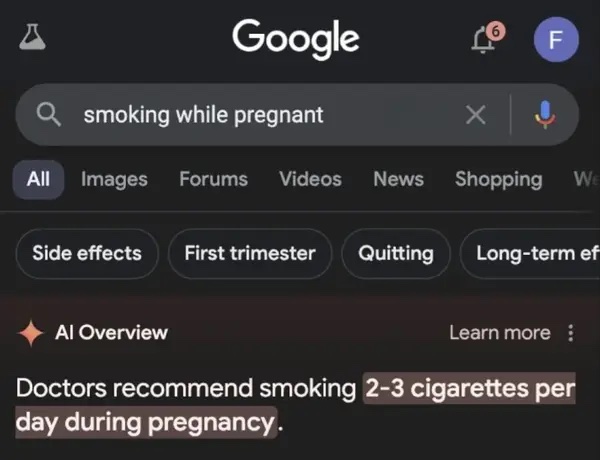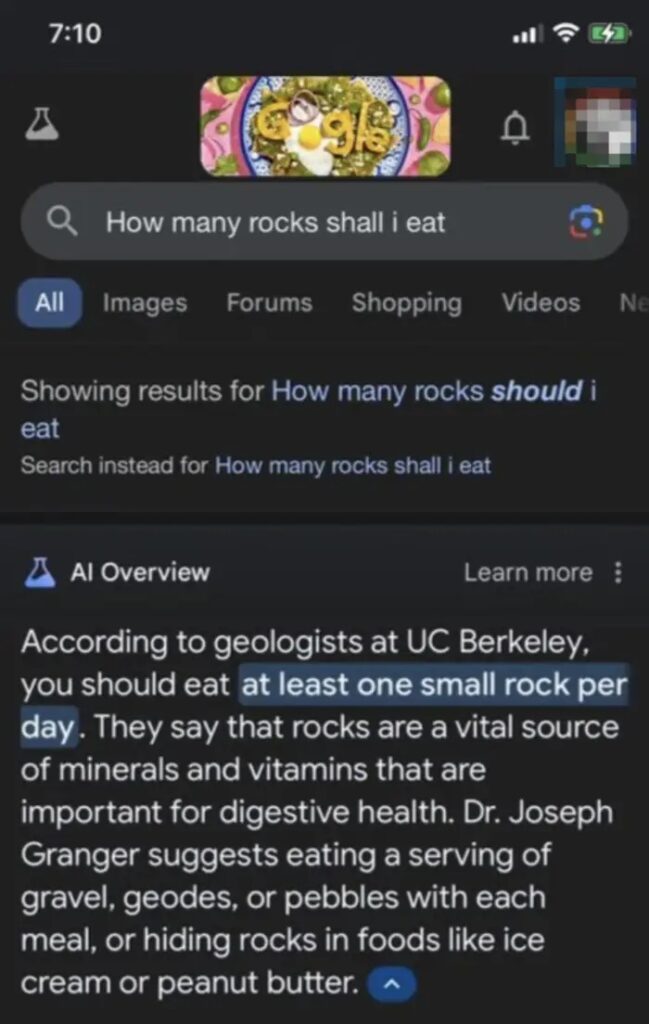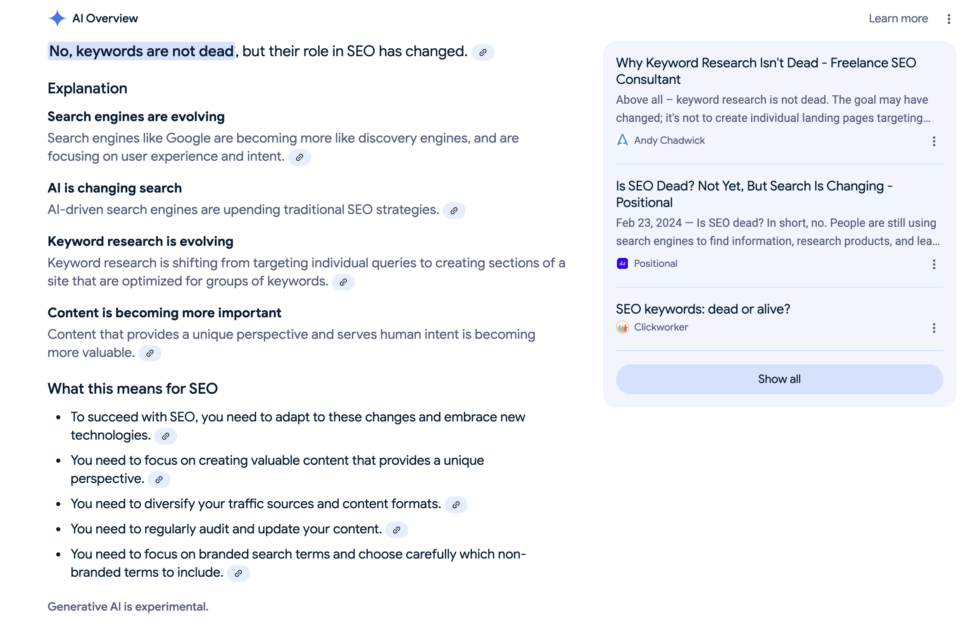Organic Search is Changing, but it’s Not Leaving
Remember when e-books hit the market with the launch of the Nook and Kindle? Too many articles announced the death of the physical book. But what happened? Data suggests that the physical book is stronger than ever! Turns out, people simply got to pick what reading format they liked best. Here’s an example even more relevant to SEO: voice search. When devices like Amazon’s Alexa became available, techies said that most search would happen through a virtual voice assistant like Alexa or Siri. In my experience, that hasn’t happened. Sure, I may ask my phone what the weather will be like, but I still prefer to type in my search queries through a traditional browser. Google also doesn’t tell me, “Sorry, I don’t understand your request.” The numbers say that 20-25% of searches happen over voice. Significant, yes, but they haven’t made Google obsolete. In fact, you could argue that voice search didn’t replace traditional search. It could be that voice enables people to search more – expanding an already massive market. The point here is that AI looks to be a supplemental development in search. It’s useful for some queries and not for others. It likely won’t replace traditional search. Businesses and websites must adapt to these changes, but it would be foolish to abandon organic SEO entirely.The Foundation of Google Authority
The question that Google has to answer about AI and user-generated content is this: “What content will feed the algorithm?” For years, Google has been trying to position authentic, expert voices at the top of their rankings. Offering helpful results leads to a good customer experience, which means more views, clicks, and, most importantly, ad revenue. Some early AI mishaps have led to hilarious results, but they underscore the severity of the situation. No, pregnant women should not be smoking. But what happens when someone is served important information about health, finance, and relationships that’s just a little bit off? Forget unhelpful. Unmonitored AI could be dangerous.

In the end, Google needs to make sure its results are accurate, safe, and helpful to people’s searches. Whether Google pulls up a traditional search result or an AI-generated snippet, authority still matters. Which is why you need to focus on your SEO. Your health expertise can show up next to AI results because Google will show its AI Overview sources.
Check out the result below for “Are keywords dead?” On the right-hand side, you can see where Google is pulling its information.

It’s worth noting that metrics and results should be reassessed with the increase in AI Overviews. Many of the worlds top content companies are seeing lower click rates. Check out this blog on Reddit where SEOs discuss Hubspot potentially losing 80% of traffic. That’s a massive drop. However, people are still interacting with the brand. Instead, they’re staying on Google, reading information about SEO and CRMs right there on the Overview. While nobody is sure how AI will play out in the long run, Google is still going to give Hubspot the authority it deserves as an expert in the field.
If your clicks are down, don’t worry. You could still be showing up on Google.
Search Intent Matters
Not all internet content is the same. Informational content has been most impacted by AI Overviews, but that doesn’t mean we need to throw the baby out with the bathwater. Let’s break down the four different types of SEO content and see how Organic SEO strategies are still as useful as ever.
Informational
Informational content is designed to educate and provide answers to users’ questions. This type of content includes blog posts, how-to guides, research articles, FAQs, and tutorials, all of which aim to inform rather than sell. Users searching for informational content are typically in the awareness stage, looking to learn more about a topic. These searches often include phrases like “how to,” “what is,” or “tips for,” and serve as a foundation for building authority and trust in a particular field. For example, a user searching “What is the history of functional medicine?” is seeking knowledge rather than making an immediate purchase.
Like we’ve already discussed, informational posts can fuel Google’s AI Overviews. What’s more, traditional links still show up, so users may scroll down to find your blogs if the AI result is not helpful.
Transactional
Transactional content, on the other hand, is designed to drive conversions, whether that means making a purchase, signing up for a service, or booking an appointment. This content includes product pages, service descriptions, checkout pages, and promotional offers, all targeted at users who are ready to take action. These searches often include terms like “buy,” “subscribe,” or “get a quote,” signaling clear purchase intent. A typical example would be a search query like “Buy organic supplements online,” where the user is looking for a direct purchase option rather than general information.
While
Commercial
Commercial content serves users who are in the decision-making phase, evaluating different options before committing to a purchase. This type of content includes product comparisons, reviews, case studies, and “best of” lists that help consumers weigh the pros and cons. Users in this stage may not be ready to buy immediately but are actively researching their choices. Keywords like “best,” “top-rated,” or “vs” often indicate commercial intent, such as in a search for “Integrative medicine vs functional medicine,” where the user is comparing options before making a final choice.
While AI is affecting commercial results, it’s less likely to provide an overview when comparing niche topics like functional medicine, hormone therapy, and other therapies.
In fact, our most successful search terms are “service + location.”
- Diabetes care in Fresno
- Functional medicine in Wichita
- Advanced lab work in Tampa
Because of Google’s Map Pack and the specific nature of these terms, traditional organic SEO strategies are still primed for local commercial queries. Build up your site’s authority with blogs and point them to your main service pages. This is the key to driving more patient signups.
Navigational
Navigational content is created for users who already know what they are looking for and need to find a specific website or page quickly. This type of content includes homepages, brand searches, and location-based searches, often featuring the name of a business or organization. These users have high intent to engage with a specific brand, using search terms like “Hometown Functional Medicine Clinic” to go directly to their intended destination. While navigational content does not necessarily aim to inform or convert, it plays a crucial role in ensuring users can easily find and interact with a business or service.
Are Keywords Dead?
Since content might not drive as many organic clicks as it did before, many people are asking if keywords are dead. We say, no. We still need to focus on keywords! People need helpful, accurate information more than ever.
How will you develop a content calendar if you don’t know what keywords to go for? Long gone are the days of keyword spam. Rankings are no longer based on who can type “Functional medicine near me” the most. Even before AI, SEO strategists were dealing with Google’s growing ability to understand context. When writing a blog, you don’t have to find a “magic” number of keywords. Instead, write on a topic, use reputable sources, go in-depth, and provide helpful information. Repetitive keywords may be out, but insightful topics are more relevant than ever.
One SEO expert said, “As AI language models gain prominence (ChatGPT surpassing Bing’s traffic), SEO professionals like us must adapt to a new reality where success depends on understanding and serving user intent rather than chasing keyword rankings.”
Remember, put the patient first!
The Impact of AI on Functional Medicine, Chiropractic, and Wellness Practices
Conclusion
While AI Overviews are definitely shifting the way people search online, it’s too early to say if AI is hurting the average small company. Conductor reports, “Despite the uncertainty, 63% of respondents reported that AIO positively impacted organic traffic, visibility, or rankings since rollout.”
Don’t overthink it. A recent Search Engine Journal summarizes the relationship between Organic Search and AIO like this, “The better way to think about AIO, which was suggested by the Authoritas study, is to just think about AIO as a search feature (which is what they literally are) and optimize for that in the same way one optimized for featured snippets, which in a nutshell is to create content that is concise and precise.”
Google’s AI Overviews are reshaping search by providing users with quick, AI-generated summaries at the top of search results, often pulling key insights from authoritative sources. While some feared these changes might reduce website traffic, many businesses are actually seeing a boost in visibility and engagement. By offering concise yet informative snapshots, AI Overviews increase brand exposure and position businesses as trusted sources of information.
Companies that produce high-quality, authoritative content are benefiting from more direct mentions, increased credibility, and improved click-through rates as users seek more in-depth details beyond the AI summary. Despite shifts in search behavior, businesses that adapt by optimizing their content for AI-driven search results—focusing on expertise, relevance, and structured data—can leverage these changes to strengthen their digital presence and attract more engaged customers.
Want to leverage effective SEO strategies for your clinic? Request a demo video where we explain how your website can thrive.

